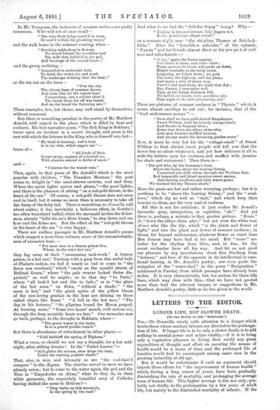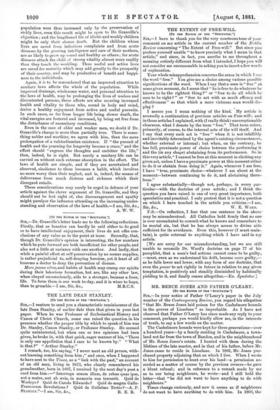LETTERS TO THE EDITOR.
LONGER LIFE, NOT SLOWER DEATH.
(TO THE EDITOR OF THE " SPECTATOR.")
SIR,—Dr. Granville wisely calls attention to a danger which besets those whose sanitary labours are directed to the prolonga- tion of life. If longer life is to be only a slower death, is to add nothing to mental power and active vitality,-11 it is to bring only a vegetative pleasure in living, then surely any great expenditure of thought and effort on ensuring the means of health would be a waste of time, and the prolonged life of lunatics would find its counterpart among saner men in the growing imbecility of old age.
But it would be unfortunate if such an argument should impede those efforts for " the improvement of human health " which, during a long course of years, have been gradually diminishing the rate of mortality, and prolonging the average term of human life. This higher average is due not only, pro- bably not chiefly, to the prolongation by a few years of adult life, but mainly to the diminished mortality of infants. If the population were thus increased only by the preservation of sickly lives, even this result might be open to Dr. Granville's objection ; and the lengthened life of idiotic and weakly children might be only their slower death. But the children whose lives are saved from infectious complaints and from acute diseases by the growing intelligence and care of their mothers, are as likely to grow up sound and healthy as others ; for acute diseases attack the child of strong vitality almost more readily than they touch the weakling. Thus useful and aetive lives are saved for maturity which may add greatly to the prosperity of their country, and may be productive of benefit and happi- ness to the individuals.
Again, it is to be remembered that an improved attention to sanitary laws affects the whole of the population. While improved drainage, wholesome water, and personal attention to the laws of health, may be prolonging the lives of useless and discontented persons, these efforts are also securing increased health and vitality to those who, sound in body and mind, derive a healthy enjoyment from active and useful pursuits. In such cases, so far from longer life being slower death, the vital energies are fostered and increased, by being set free from the disturbance of unsanitary conditions.
Even in the case of older and weaker men, we doubt if Dr. Granville's charge is more than partially true. There is some- thing nobler and worthier, we agree with him, than the mere prolongation of a valetudinarian existence. If "the pursuit of health and the yearning for longevity become a craze," and the effort should " engross the thoughts and embitter the life," then, indeed, he is right. But surely a sanitary life can be carried on without such extreme absorption in the effort. The laws of health are simple, and if they are ascertained and observed, obedience to them becomes a habit, which involves no more worry than their neglect, and is, indeed, the means of deliverance from much distress and sickness which their disregard entails.
These considerations may surely be urged in defence of your article against the clever argument of Dr. Granville, and they should not be lost sight of, else discouragement and apathy might paralyse the influence attending on the increasing under- standing and observation of the laws of health.—I am, Sir, &c., A. W. W.































 Previous page
Previous page